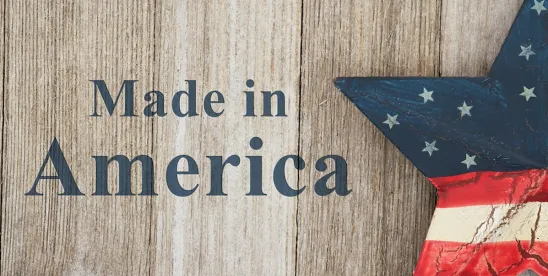The Made in the USA label carries significant marketing weight, especially in today’s political landscape, but it also comes with legal risks. Federal regulators and class action attorneys are scrutinizing origin claims, leading major brands to face substantial penalties. The primary enforcement avenue for the Federal Trade Commission (“FTC”) is its Made in USA Labeling Rule, issued in 2021, which states that a product cannot be labeled as Made in the USA unless “all or virtually all” of its components are made in the U.S. A corporation must have and rely on a “reasonable basis” to back up a claim that its product was made in the U.S. There are generally two types of Made in the USA claims—qualified and unqualified.
Unqualified claims, i.e., those that do not explain or limit the extent to which a product has been made in the U.S., present the most risk for businesses. To make an unqualified Made in the USA claim, the product must be “all or virtually all” made in the U.S. This means: (1) the final assembly or processing occurs in the U.S.; (2) all significant processing that goes into the product occurs in the U.S.; or (3) all or virtually all ingredients/components are made and sourced in the U.S.
The FTC considers other factors as well, including how much of the total manufacturing costs can be assigned to the U.S., how far-removed foreign content is from the final product, and the importance of foreign content to the final product. Additionally, a product may claim to be “Assembled in the USA” if its last “substantial transformation” occurred in the U.S. Critically, when foreign components are assembled into a final product in the U.S., it is not a “substantial transformation.”
Qualified claims describe the extent, amount or type of a product’s domestic content or processing. For example, an advertisement claiming that a product includes “60% U.S. content” or was “Made in the USA of U.S. and imported parts.” Qualified claims may be appropriate if a product “include[s] U.S. content or processing” but otherwise fails to meet the criteria for an unqualified Made in the USA claim.
Many corporations—both big and small—have faced class action lawsuits and FTC investigations regarding their claims that products are Made in the USA. As a result, companies are paying multi-million-dollar settlements:
- In April, a California jury hit R.C. Bigelow with a $2.36 million judgment in a class action lawsuit over its Made in the USA claims. While the company admitted to sourcing its tea from overseas, it argued that the label referred to the tea bags and assembly process.[1]
- In February, haircare brand Olaplex settled a lawsuit that alleged certain produces were falsely advertised as Made in the USA. Without admitting wrongdoing, Olaplex agreed to send $5 vouchers to class members in addition to paying $1.35 million in fees and costs.[2]
- In 2024, Williams-Sonoma paid the biggest civil penalty in a Made in the USA enforcement case by the FTC totaling $3.17 million.[3]
And there are several class action lawsuits currently pending against many other companies.[4]
What To Do
Corporations should remember that they have an ongoing obligation to ensure that their products are correctly labeled, which also means communicating with suppliers and manufacturers. Additionally, corporations should consider their use of U.S. imagery on their products to avoid making an implied Made in the USA claim without substantiation.
[1] Banks v. R.C. Bigelow Inc., No. 2:20-cv-06208 (C.D. Cal.)
[2] Atamian v. Olaplex Inc., et al., Case No. 37-2024-00018492-CU-BT-CTL, in the Superior Court of California, County of San Diego
[3] https://www.ftc.gov/news-
[4] Allen v. Mielle Organics LLC, Case No. 8:25-cv-00342 (C.D. Cal.); Lauer, et al. v. John Paul Mitchell Systems, Case No. 1:25-cv-02438 (N.D. Ill.); [6] Sepian, et al. v. Goya Foods Inc., Case No. 2:25-cv-01512 (C.D. Cal.); Daldalian v. PepsiCo Inc., et al., Case No. 2:25-cv-01491 (C.D. Cal.); Roblyer v. Paula’s Choice Inc., et al., Case No. 2:25-cv-01364-DJC-CSK (E.D. Cal.); Anaya Washington v. Reynolds Consumer Products LLC, Case No. 1:24-cv-02327 (S.D.N.Y.); Lavallee v. Dermalogica LLC, et al., Case No. 8:25-cv-01013 (C.D. Cal.); Kaufmann v. Nordic Ware Inc., Case No. 0:25-cv-01379 (Minn.); Karter, et al. v. Dude Products Inc., Case No. 3:25-cv-00663 (S.D. Cal.); Norman Husar v. General Motors LLC, Case No. 1:21-cv-00204 (S.D. Ohio)





 />i
/>i
